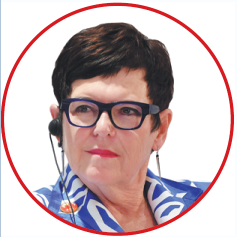
Feb 4, 1952, in New Zealand
EDUCATION:
1965-68: Marlborough Girls' College
1969-71: Diploma of Education, Christchurch College of Education
CAREER:
1971-76: Primary school teacher
1987-2002: Member of Parliament
1990-97: Minister for various sectors including social welfare, women's affairs, and health
1997-99: Prime minister of New Zealand
2012-present: Executive board member, New Zealand China Council
2014-present: Chairman of China Construction Bank (New Zealand) and Oravida NZ
2015-present: Board member, Boao Forum for Asia
China's investment in education impresses
Holding up half the sky
Long an advocate for women's rights in New Zealand, Shipley has also played leading roles at Global Women NZ and Heart Foundation NZ's "Go Red for Women" campaign. She was made a Dame Companion of the New Zealand Order of Merit in August 2009.
She made her visit to China in 1995 to attend the Fourth World Conference on Women in Beijing.
"Beijing today and the Beijing then are unrecognizable," she said. "But it was an important moment because the world's women leaders came to China, and China was just beginning to have the confidence to have those conversations."
There has been a lot of progress made in the country's efforts to ensure the rights of women and children, Shipley said.
"I am often reminded of Chairman Mao Zedong's comment - women holding up half the sky," she said.
"In my experience, when women and men sit down together and share the responsibility of making decisions, whether it's in government or in corporate leadership or in social enterprise or environmental decision-making, we all bring a broader range of values and perspectives that serve the future."
That is one of the reasons, Shipley said, that she is committed to coming back to China, whether it is for the Boao Forum for Asia or the International Finance Forum.
"I want more men and women like myself to be sitting at the table sharing the responsibility," she said.
China's global reach
Recalling her experience in China over the past decades, Shipley said the country has changed in every aspect.
It has not only focused on domestic reform, but has also reached out.
Shipley said the Belt and Road Initiative is one of the biggest ideas she has ever heard of globally.
"It is a next-generation idea. And in my opinion, it has the potential to create the next wave of economic growth. But we must all be committed to momentum," she said.
"One of the great successes of China's 40 years since opening up was the connecting of people to markets and markets to people within China, which created that huge wave of progress from agrarian to industrialization, and now to high-tech. The Belt and Road Initiative is carrying that dream internationally.
"We can share both the success of being connected and the future growth of the economy.
"The WTO is a good example, and then other regional free trade agreements with China and her neighbors and others in the region finding ways to work together."
Shipley, who has been a director of the Boao Forum for Asia since 2015, said she had been more than encouraged by Xi's announcement at the forum last year of measures China will adopt to further open up.
During the forum, in Boao, Hainan province, in April, Xi announced an array of measures to continue opening up the country's economy, including broadening access to the Chinese market, enforcing strong protection of intellectual property rights, lowering tariffs on vehicle imports, importing more products that are competitive and needed by the Chinese people, and holding the first China International Import Expo in Shanghai in November.
"It was very encouraging to hear President Xi's comments. Because people were anxious as we came to the forum," Shipley said. "Forty years. Is this going to be a pause or a next step? And he made clear China's commitment to multilateralism, which was a great source of pleasure to the international audience that was present.
"China will need to continue to think about how it opens up. We will all need to learn to listen to China and where her anxieties are. We need to have China and the United States find ways to move forward together.
"We need to remember that small economies matter as well as big economies, because we are a family - a global family."
Shipley said she believes reform of the WTO should be high on the agenda for the world's major economies.
"I think the Asia-Pacific region, with China and the US and South America and Japan and Russia, and even small economies like New Zealand, we can share this responsibility," she said, adding that a newly reformed WTO will have to be fit for now and the future, just as it was fit for 1944.
"Because it is a different world than 40 years ago," she said. "There is nearly three times the population on our earth, so we need to act globally. We need to act regionally.
"But of course, every country is going to act in its own interest. President Xi Jinping has explained China's interest in its desire to work collectively and we now need to develop the mechanisms to be fit for the next generation.
"China's success at home has also shared success internationally, and New Zealand and our economy have grown because China's demand needs our goods, and we need China's goods.
"So the reciprocity of the last 40 years is very important. I'm sure we look forward with anticipation to what's next - the next 40 years."


